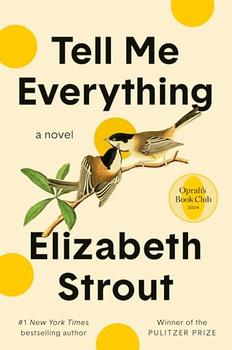Summary | Excerpt | Reading Guide | Reviews | Beyond the Book | Readalikes | Genres & Themes | Author Bio

A Novel
by Elizabeth Strout1
This is the story of Bob Burgess, a tall, heavyset man who lives in the town of Crosby, Maine, and he is sixty-five years old at the time that we are speaking of him. Bob has a big heart, but he does not know that about himself; like many of us, he does not know himself as well as he assumes to, and he would never believe he had anything worthy in his life to document. But he does; we all do.
* * *
Autumn comes early to Maine.
By the second or third week in August a person driving in a car might glance up and see in the distance the top of a tree that has become red. In Crosby, Maine, this year it happened first with the large maple tree by the church, and yet it was not even midway through the month of August. But the tree began to change color on its side facing east. This was curious to those who had lived there for years, they could not remember that being the first tree to change color. By the end of August, the entire tree was not red but a slightly orange yellowy thing, to be seen as you turned the corner onto Main Street. And then September followed, the summer people went back to where they had come from, and the streets of Crosby often had only a few people walking down them. The leaves did not seem vibrant, overall, and people speculated that this was because of the lack of rainfall that August—and September—had endured.
A few years earlier, people entering the town of Crosby from the turnpike's exit would drive past a car dealership and a donut shop and a diner, and also by large run-down wooden houses whose porches held things like bicycle tires and plastic toys and coat hangers and air conditioning units that had not been used in years, and in one of these houses a middle-aged man named Ricky Davis lived. He was a large man and frequently drunk and could often be seen leaning over the rail of his side porch with his pants halfway down showing his huge bottom, crack and all, to the folks driving by, and those who had not seen this before would turn their heads to watch with a sense of wonderment. But then the town council had voted to put in the new police station at that spot, and so Ricky Davis and the house he had lived in were now gone; it was rumored that he was living out near the old fairgrounds in a Hatfield Housing unit.
When you got into the middle of the town you could see a large brick house that stood a little off Main Street. After the clocks were set back in November, making it dark earlier, the few folks driving by, and those who might be strolling on the sidewalk across the street, could see into the windows of this house, yellow from the lamps turned on inside, and Bob Burgess and his wife, Margaret Estaver, might be observed cooking together in their kitchen until they tugged their curtains closed. People knew who they were, and in a way not fully conscious there was a sense of safety that came from this couple living right here in the middle of town: Margaret was the Unitarian minister, and she had her following. Bob had been a lawyer in New York City for many years in his younger days, but nobody held this against him, probably because he had grown up in Shirley Falls, forty-five minutes away; he had returned to Maine almost fifteen years ago when he married Margaret. He still took occasional criminal cases in Shirley Falls and was known to keep an office there, though he had mostly retired by now. And also—people spoke of this quietly—Bob had suffered a tragedy in childhood: He had been playing with the gearshift of the family car and it had rolled down the hill of the Burgesses' driveway; people in town understood that the car—and therefore Bob—had killed Bob's father, who was checking on their mailbox there.
Olive Kitteridge, who was ninety years old and living in the retirement community called the Maple Tree Apartments, knew this about Bob Burgess and she had always liked him, she thought he had a quiet sadness to him, most likely from this early misfortune. Olive did not particularly care for Bob's wife, Margaret. This was because Margaret was a minister and Olive did not like ministers—except for Cookie, who had married her to her first husband, Henry. Wonderful man, Reverend Daniel Cooke. And wonderful man, Henry Kitteridge.
Excerpted from Tell Me Everything: Oprah's Book Club by Elizabeth Strout. Copyright © 2024 by Elizabeth Strout. All rights reserved. No part of this excerpt may be reproduced or reprinted without permission in writing from the publisher.
Wisdom is the reward you get for a lifetime of listening when you'd rather have been talking
Click Here to find out who said this, as well as discovering other famous literary quotes!
Your guide toexceptional books
BookBrowse seeks out and recommends the best in contemporary fiction and nonfiction—books that not only engage and entertain but also deepen our understanding of ourselves and the world around us.